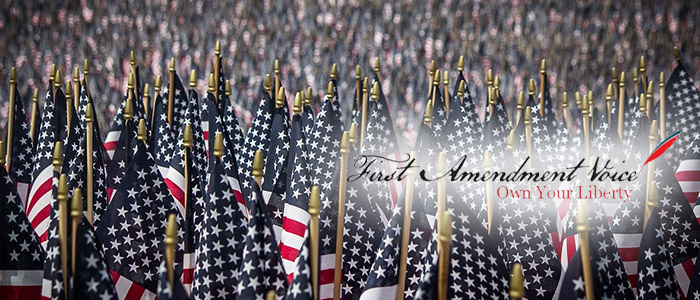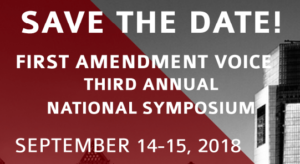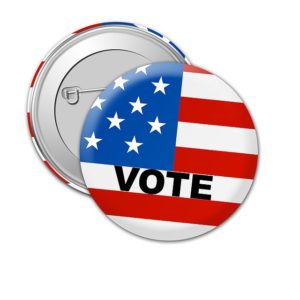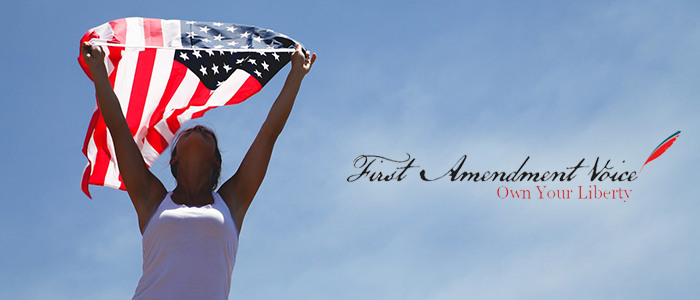
by Dan | May 23, 2018 | Newsletter
FAV Family,

See Upcoming Events BELOW for more details
While lining up a coffee talk in partnership with PEN America to discuss Press Freedom and news consumption, I reached out to numerous organizations.
One individual called me back, and we had a long conversation about FAV, press freedom and the type of discussion we generally have with respect to first amendment issues and trends in how people consume news. Her organization was affiliated with a political party. After we scheduled a session for me to come speak, she asked if my wife planned to attend and whether she was a member of the party. I responded that my wife and I are not registered in any political party and remain nonpartisan in our political activity. This caused quite the reaction.
The woman cited a rule that only registered members of her party were allowed to speak to the organization. “I don’t make the rules; I’m just letting you know what they are.” I responded that as a 25-year veteran, having served 40 months in combat, maybe I had something to offer the group, regardless of political affiliation.
Her response, “I don’t make the rules; I’m just letting you know what they are.”
Maybe this is a new norm? Are people so insulated in their bubbles that they are afraid to hear what others might say? Planning for Philadelphia this September, we plan to tackle this issue head on. We recently secured a wonderful speaker, Kern Beare, who routinely hosts “Difficult Conversations” workshops; how to bridge divides and engage with those with whom we disagree. Learn more about Kern’s story.
I hope you will consider joining us. We think you will find the experience meaningful.
Please forward this newsletter to friends and colleagues you think would appreciate FAV’s work. Subscribe here.
Yours in service,
Steve Miska and the FAV Team
 Citizen’s Call to Action
Citizen’s Call to Action
It’s primary season in many states around the republic. Don’t forget to register and vote! Citizenship is not a spectator sport! #OwnYourLiberty
In the News
An article from the New York Times highlights the battlegrounds for free expression and technology. Read an excerpt:
BERLIN — Security is tight at this brick building on the western edge of Berlin. Inside, a sign warns: “Everybody without a badge is a potential spy!”
Spread over five floors, hundreds of men and women sit in rows of six scanning their computer screens. All have signed nondisclosure agreements. Four trauma specialists are at their disposal seven days a week.
They are the agents of Facebook. And they have the power to decide what is free speech and what is hate speech…
Richard Allan, Facebook’s vice president for public policy in Europe and the leader of the company’s lobbying effort against the German legislation, put it more simply: “We don’t want to be the arbiters of free speech.”
>>continue reading
UPCOMING EVENTS:
First Amendment Voice Third Annual Symposium
Join us at our national convening in the City of Philadelphia,founded by William Penn as a place of religious tolerance, as we join people of faith and conscience to celebrate our Constitutional ideals; honor the annual Constitution/Citizenship Day; and address the erosion of our First Amendment Rights.
- Date: September 14-15, 2018
- Location: National Constitution Center (525 Arch Street, Philadelphia, PA 19106)
Symposium Flyer 2018 – Save the Date

by Dan | May 16, 2018 | Uncategorized
 Compared to other forms of advertising, there are few restrictions placed upon online advertisements. Is this acceptable, or should we seek additional policy changes? Here are a few options we have available when considering how the First Amendment might regulate online ads:
Compared to other forms of advertising, there are few restrictions placed upon online advertisements. Is this acceptable, or should we seek additional policy changes? Here are a few options we have available when considering how the First Amendment might regulate online ads:
Option 1: Unrestricted Commercial Speech
The concept of commercial speech arose from a 1942 Supreme Court decision, Valentine v. Chrestensen. Since then, commercial speech rights have expanded to the point where corporations have similar free speech protections as U.S. citizens when it comes to the First Amendment.
In an online context, unrestricted commercial speech would likely mean that platforms hosting advertisements (such as Google or Twitter) decide what they believe is acceptable to advertise on their websites, with no external regulations coming from the government. On one hand, this could be advantageous because profit-seeking corporations have an incentive to avoid public backlash, which means they would likely avoid hosting advertisements for socially unacceptable products and services.
On the other hand, this option allows corporations full control over what advertisements consumers will or won’t see, which could lead to unnecessary censorship of certain political views or targeting children with advertisements, as YouTube was recently caught doing.
Option 2: Let the Public Decide
Democracy is a complicated process, but there are many avenues through which American citizens can make their voices heard. When it comes to online advertisements, public outrage against certain companies or platforms has prompted other corporations to pull their ads from various platforms like YouTube and Facebook. For instance, in 2017, YouTube lost millions of dollars after advertisements were shown alongside videos promoting terrorist activity and hateful speech.
There have also been Change.org petitions from members of the public demanding change from advertisers. While many corporations may choose to overlook any public outcry against them on social media or on Change.org, the visibility of public protests on petition sites can be useful for enacting changes to online advertising norms without the need for governmental intervention.
Option 3: Incremental Regulations from the Government
This approach to online advertising regulations is already happening right now. Through the Federal Trade Commission, the government regulates online advertising and other forms of speech, though currently there are fewer laws designed for Internet-based ads in comparison to traditional forms of advertising like print, radio and television. For example, barely any regulations exist for online campaign advertisements, while the Federal Communications Commission (FCC) regulates offline political advertisements.
Should online advertisements be subject to the same rules as print, radio and television advertisements? Perhaps this will be the case in the future, but for now, it remains largely uncharted territory for the marketing world, in which corporations dictate what they’ll allow or disallow. It’s ultimately up to us as consumers to utilize our First Amendment rights to speak out in favor or against unrestricted commercial speech online.

by Dan | Apr 26, 2018 | Uncategorized
 In a recent discussion panel with conservative student group Turning Point USA, President Trump said the on-campus free speech crisis is “highly overblown.”
In a recent discussion panel with conservative student group Turning Point USA, President Trump said the on-campus free speech crisis is “highly overblown.”
Specifically, Trump said, “If you look at what’s going on with free speech with the super left, with antifa, with all of these characters. I’ll tell you what, they get a lot of publicity, but you go to the real campuses, and you go all over the country, you go out to the Middle West, you go out even to the coast in many cases, we have a tremendous support. I would say we have majority support. I think it’s highly overblown. Highly overblown.”
Although a recent Gallup poll found the majority of college students support freedom of speech on their campuses, that same poll found that a majority of students also support restrictions against hate speech on campuses. Other research has shown college students and graduates actually support freedom of speech more than other demographic groups, and that support for our First Amendment rights has consistently risen over time (despite what present-day media reports might suggest).
So is the issue truly “overblown” like President Trump says it is? Consider these two perspectives:
Campus Diversity and Inclusiveness
On one hand, there’s the mentality that some groups of students have been historically oppressed or restricted from accessing the same educational and employment opportunities as other groups. In this sense, students believe there should be restrictions against hate speech targeting racial/ethnic minorities because they’ve already encountered this damaging treatment for decades, and that sexually-charged speech against predominantly female students should be considered harassment (and thus, banned) because it creates a fearful environment for those targeted by such comments.
As this humorous and informative video about political correctness from 8-Bit Philosophy explains, the climate of PC-ness might seem to be getting out of hand, but it’s not entirely bad. For instance, hate speech and verbal harassment on campus could drive students to drop out of college in fear for their safety. Advocates for restricting hate speech on college campuses thereby argue that doing so could offer a better learning environment and protect students against the negative psychological consequences of constant harassment.
Freedom of Speech for Political Minorities
In many universities across the U.S., students and faculty members are likely more liberal-leaning than conservative. From this perspective, conservative members of the campus community often feel as though they must restrain their speech and expression to avoid backlash from the politically correct crowd. Although there exist several conservative student clubs and organizations around the country, they tend to be outnumbered by their liberal counterparts.
It doesn’t help the issue that many college campuses limit free speech to certain designated areas and times of the day. These “free speech zones” have been ruled unconstitutional in several legal cases, but they nevertheless continue to exist on other campuses where they haven’t been challenged in court yet.
The question ultimately comes down to this: even if students largely disagree with certain viewpoints, should those viewpoints be marginalized or even silenced for the sake of political correctness or inclusion? Many First Amendment advocates say no, but the tension between freedom of speech and creating a safe learning environment for all students will likely remain a contentious issue for years to come.

by Dan | Apr 17, 2018 | Newsletter
FAV Family,
We have seen a massive uprising amongst students concerned about gun violence in schools and the fact that political leaders have not been able to develop effective solutions. As a result, students have activated and begun exercising their First Amendment rights with respect to freedom of assembly, petitioning the government for grievance, and ensuring that their voices are part of the national conversation. Some of these young leaders have been demonized in certain parts of the media and derisively attacked on social media. Regardless of your perspective on how to address gun violence in the United States, I would ask that you encourage young voices to join the conversation in civil ways. The country benefits when youth become involved in citizenship. By seeking understanding first, we can set a tone for constructive discussion about important issues in our society.
Please forward this newsletter to friends and colleagues you think would appreciate FAV’s work. Subscribe here.
Yours in service and civility,
The FAV Team
 Critical Thinking Tip: Before reading a book/article/blog, know the author. Don’t waste your time reading until you understand the author’s background and history, essentially what biases they bring to their writing. THEN, read the book/article/blog and take into account the expected biases. Seek out alternative viewpoints, writers/speakers who you know DISAGREE with the author/speaker. In that way you can carefully consider different perspectives about the topic and form a more comprehensive opinion. SMILE. If you’re not getting shot at, it’s not that bad! We live in an amazing society. Only through striving to actively contribute to that society can we endeavor toward its aspirational ideals.
Critical Thinking Tip: Before reading a book/article/blog, know the author. Don’t waste your time reading until you understand the author’s background and history, essentially what biases they bring to their writing. THEN, read the book/article/blog and take into account the expected biases. Seek out alternative viewpoints, writers/speakers who you know DISAGREE with the author/speaker. In that way you can carefully consider different perspectives about the topic and form a more comprehensive opinion. SMILE. If you’re not getting shot at, it’s not that bad! We live in an amazing society. Only through striving to actively contribute to that society can we endeavor toward its aspirational ideals.
In the News
In the world of social media, firms collect an amazing amount of personal data about their users. Read this Buzzfeed article to learn more about how much information Facebook and other firms collect and how they use that data. You probably don’t have as much privacy as you think.
Countering campus bigotry. This article involves a student calling out a professor for alienating comments.
UPCOMING EVENTS:
FAV Coffee Talks – The Media sponsored by PEN America
Open to all: REGISTER NOW
Free breakfast for the first 20 registrants
Hosted by Saint Andrews By The Sea United Methodist Church in San Clemente, CA on April 21, 2018 from 8 – 9:30am PST
Other Stakeholders
Pop The Bubble Workshop, Kern Beare
Redding, CA on May 1, 2018
LEARN MORE

by Dan | Apr 11, 2018 | Uncategorized
 We hear a lot about free speech issues relating to college campuses, but what about K-12 students? Should they have full access to their First Amendment rights, or are they limited until they’re 18 years old and free from mandatory school requirements? Here are three big issues to consider:
We hear a lot about free speech issues relating to college campuses, but what about K-12 students? Should they have full access to their First Amendment rights, or are they limited until they’re 18 years old and free from mandatory school requirements? Here are three big issues to consider:
School Walk-Outs (freedom to petition)
On March 14 – one month after the Parkland shooting in Florida – students at 2,500 schools across the country planned a walk-out in protest of governmental inaction on gun control policies. However, some faculty members and school administrators threatened to suspend students who walked out of class because doing so could disrupt the learning process.
Does the freedom to protest only exist outside of regular school hours? There is no clear answer here, but it’s well-worth considering as students become more politically active in the future.
School Newspaper Censorship (freedom of press)
Freedom of the press is limited for school-sponsored newspapers, thanks to the 1988 Supreme Court decision (5-3) that determined student publications could be censored if the decision to do so was “reasonably related to a legitimate pedagogical purpose.” Unfortunately for students, the vague phrasing of the decision opened the gateway for school administrators to censor content based on largely arbitrary standards, as long as they attempted to justify the decision in line with the Supreme Court’s ruling.
Although some states have laws in place to protect student journalists’ rights to freedom of publication, many states still allow school administrators and faculty to control what is deemed publishable in a school newspaper. These instances of censorship have led organizations such as the Student Press Law Center to create resources for students who believe their First Amendment rights are being violated, and other students have ditched their school-sponsored publications in favor of online websites dedicated to informing the student body without the intrusion of administrators censoring their speech.
Praying in Public Schools (freedom of religion)
Although public school-sponsored prayers were deemed unconstitutional by the Supreme Court, religious expression is still available to students (in spite of the confusion surrounding students’ freedom of religious expression). Students can choose to pray (or not), create or join religious groups (as long as they don’t proselytize to other, non-consenting students), say “Merry Christmas,” and learn about different religions in the classroom.
Although common misperceptions of public schools as religion-free zones remain, K-12 students in public schools are largely protected when it comes to their First Amendment rights to freedom of religion (as long as they don’t disrupt classes or impose their beliefs on other students).


 Citizen’s Call to Action
Citizen’s Call to Action

 Compared to other forms of advertising, there are few restrictions placed upon online advertisements. Is this acceptable, or should we seek additional policy changes? Here are a few options we have available when considering how the First Amendment might regulate online ads:
Compared to other forms of advertising, there are few restrictions placed upon online advertisements. Is this acceptable, or should we seek additional policy changes? Here are a few options we have available when considering how the First Amendment might regulate online ads:
 In a recent discussion panel with conservative student group Turning Point USA, President Trump said the on-campus free speech crisis is “highly overblown.”
In a recent discussion panel with conservative student group Turning Point USA, President Trump said the on-campus free speech crisis is “highly overblown.”
 Critical Thinking Tip: Before reading a book/article/blog, know the author. Don’t waste your time reading until you understand the author’s background and history, essentially what biases they bring to their writing. THEN, read the book/article/blog and take into account the expected biases. Seek out alternative viewpoints, writers/speakers who you know DISAGREE with the author/speaker. In that way you can carefully consider different perspectives about the topic and form a more comprehensive opinion. SMILE. If you’re not getting shot at, it’s not that bad! We live in an amazing society. Only through striving to actively contribute to that society can we endeavor toward its aspirational ideals.
Critical Thinking Tip: Before reading a book/article/blog, know the author. Don’t waste your time reading until you understand the author’s background and history, essentially what biases they bring to their writing. THEN, read the book/article/blog and take into account the expected biases. Seek out alternative viewpoints, writers/speakers who you know DISAGREE with the author/speaker. In that way you can carefully consider different perspectives about the topic and form a more comprehensive opinion. SMILE. If you’re not getting shot at, it’s not that bad! We live in an amazing society. Only through striving to actively contribute to that society can we endeavor toward its aspirational ideals.
 We hear a lot about free speech issues relating to college campuses, but what about K-12 students? Should they have full
We hear a lot about free speech issues relating to college campuses, but what about K-12 students? Should they have full 



